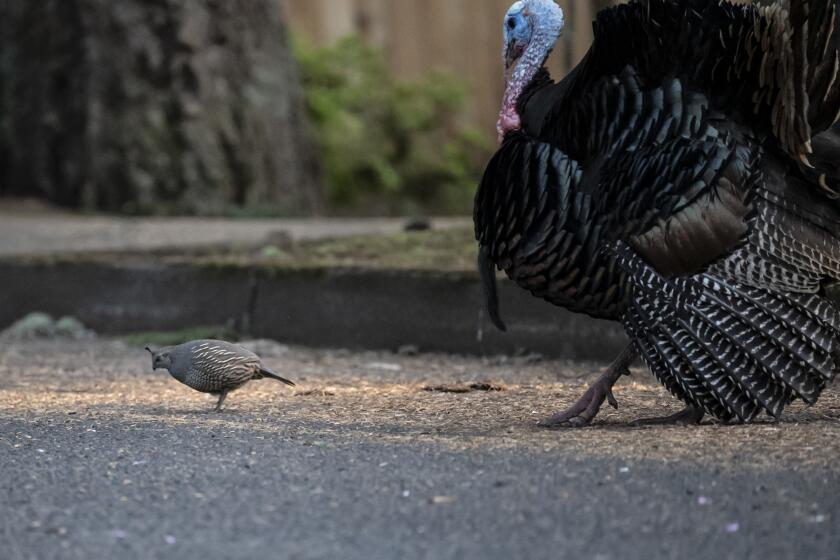Last of 3 Elephants Sent From San Diego to Chicago Dies
The death of the last of three elephants transferred from the San Diego Wild Animal Park to other facilities has zoo officials pondering what went wrong and animal-rights activists saying “We told you so.”
“It’s a sad day,” San Diego Zoo Executive Director Douglas Myers said of the death of Wankie, a 36-year-old African elephant that belonged to the zoo. The elephant was euthanized early Sunday at the Hogle Zoo in Salt Lake City, after she had arrived Saturday night from Chicago’s Lincoln Park Zoo unable to stand.
Wankie was the last of three elephants to die since they were moved in 2003 from San Diego to the Lincoln Park Zoo over the protests of People for the Ethical Treatment of Animals and other animal-rights groups.
The activists argued that Chicago, with its bitterly cold winters, was no place for elephants used to balmy San Diego and urged that they be sent to a sanctuary instead.
Peaches, 55, believed to be the oldest female African elephant in captivity in the U.S., died at Lincoln Park earlier this year, apparently of old age. Tatima, 35, died in October of a disease similar to tuberculosis.
Wankie’s problems apparently began some time during her 1,400-mile journey to Utah.
“She went into the crate without any problem at all, and she loaded up just fine,” Myers said. When Wankie arrived at Hogle Zoo on Saturday evening, she was greeted by more than a dozen animal-care professionals.
“They knew there was something wrong,” Myers said. “She was down in her crate and that’s not a good sign. It’s not bad for an elephant to lie down. It’s bad when they can’t get back up.”
Chicago-based Debbie Leahy, PETA’s director for captive animals and entertainment issues, said the death confirmed her worst fears.
“We wrote to the Lincoln Park Zoo director and begged him not to take the animals,” Leahy said. The group had kept track of the elephants in Chicago, and “it was obvious they weren’t doing well,” she said.
Wankie’s death “underscores the problem of keeping elephants in zoos,” Leahy said. PETA wanted the elephants sent to one of two sanctuaries in the country where they would have been able to bond with other females and roam freely.
“These are animals who in the wild would be walking 30 miles a day, and this activity is essential for their health and well-being,” she said.
Myers said the three elephants had been loaned to the Chicago zoo to make room in San Diego for seven African elephants about to be killed in their native Swaziland. An eighth was born at the wild animal park in February. Lincoln Park was chosen because it had an excellent elephant facility but no elephants, Myers said.
Female elephants are social animals, so after Wankie’s two companions died, zoo officials decided to move Wankie to Hogle, which has three African females.
But when she arrived she couldn’t put any weight on her back legs, said Hogle spokeswoman Stacey Phillips, who watched as 20 veterinarians and others worked through the night to try save the elephant.
After Wankie was taken out of her crate with a crane, the staff tried to get her to stand. They massaged her back legs and sprayed them with warm water. As the caregivers tried one strategy after another, they plied Wankie with treats of carrots and apples.
“We tried everything we reasonably could,” said Hogle Executive Director Craig Dinsmore. Wankie was alert, but “when a big animal like this is in trouble, we do what we can, but they have to help, because they are so big, and she didn’t have the capacity to do that,” he said.
Despite the team’s efforts, Wankie’s condition continued to deteriorate, Myers said. “She was in pain and it was determined that it wasn’t humane to allow it to go on.”
A veterinarian put the elephant down about 4 a.m. Sunday.
“It was a heart-wrenching decision,” Phillips said.
Lincoln Park Zoo sent an independent pathologist to Utah to conduct a necropsy -- the animal equivalent of an autopsy -- to pinpoint the cause of death.
The Chicago zoo also plans an independent audit of its animal-care systems, zoo chief Kevin Bell said. The zoo will further study how cold affects captive elephants and socialization issues, he said.
The Chicago zoo plans to adapt its elephant exhibit to house its Bactrian camel herd.
“For the foreseeable future,” Bell said, “we are not going to bring elephants back.”
More to Read
Start your day right
Sign up for Essential California for news, features and recommendations from the L.A. Times and beyond in your inbox six days a week.
You may occasionally receive promotional content from the Los Angeles Times.






